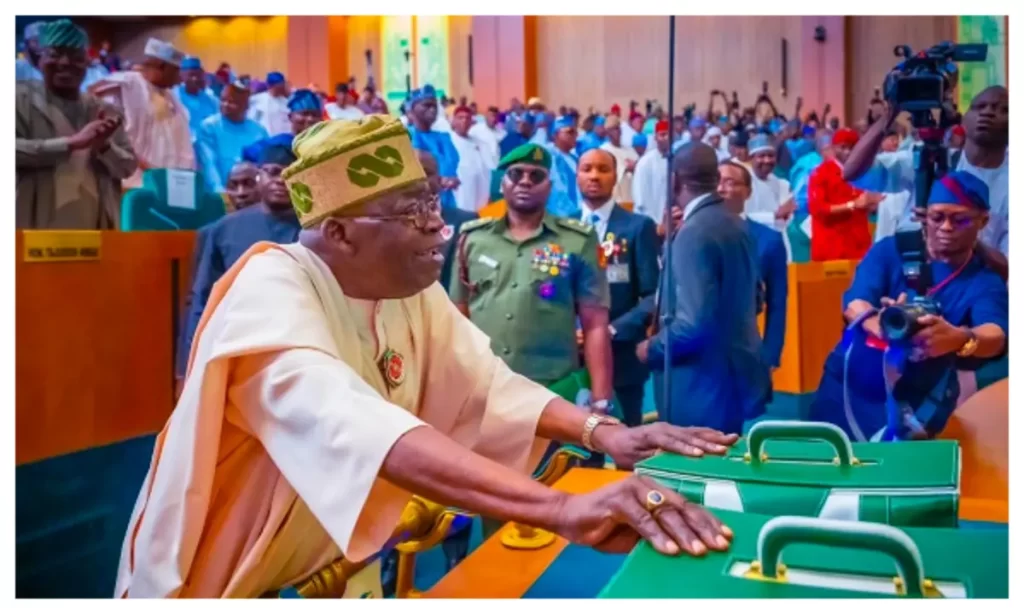President Bola Ahmed Tinubu’s presentation of the N49.7 trillion 2025 budget proposal to the National Assembly has sparked mixed reactions among Nigerians, economists, and financial analysts. The proposed budget represents a significant increase compared to the N30.94 trillion budget for 2024. The announcement was made on Wednesday and highlights the government’s priorities and economic assumptions for the upcoming fiscal year.
Highlights of the 2025 Budget Proposal
The budget proposal allocates substantial funds to key sectors, including:
- Defence and Security: N4.91 trillion
- Infrastructure: N4.06 trillion
- Education: N3.52 trillion
- Health: N2.48 trillion
Also read Honoring Heroes: Governor Sanwo-Olu Donates N75 Million to Nigerian Legion
The budget is built on the following assumptions:
- GDP growth rate of 4.6%.
- Inflation rate reduced to 15.75%.
- Exchange rate of N1,500 per dollar.
- Oil production at 2.06 million barrels per day.
- Crude oil price set at $70 per barrel.
The 2025 budget also projects revenue of N36.36 trillion and a deficit of N13.39 trillion.
Commendations for Budget Priorities
Muda Yusuf, Chief Executive of the Centre for the Promotion of Private Enterprise, commended the emphasis on Defence, Security, Infrastructure, Education, and Health. According to Yusuf, these priorities align with Nigeria’s current economic and social challenges. He noted that Tinubu’s optimism for economic revitalization is grounded in reduced fuel importation, better agricultural output, improved security, and increased foreign exchange inflows.
“The President’s optimism for a positive economic outlook is realistic given these pathways,” Yusuf stated. However, he emphasized the need for unwavering political and policy commitment to achieve these goals.
Yusuf also pointed out some concerns, such as the N15 trillion earmarked for debt servicing and the ambitious revenue projection, which may lead to additional tax pressures on investors.
Skepticism Over Assumptions
Prof. Godwin Oyedokun of Lead City University expressed skepticism about some key assumptions in the budget. He described the N1,500 per dollar exchange rate as unrealistic, given the disparity in the parallel market. Similarly, the $70 per barrel oil price benchmark was deemed overly optimistic due to global market volatility and geopolitical uncertainties.
“The projected oil production of 2.06 million barrels per day faces significant challenges such as oil theft, pipeline vandalism, and aging infrastructure,” Oyedokun added.
While Oyedokun acknowledged the importance of the allocations to Defence, he raised concerns about balancing security spending with investments in human development. He also flagged the N13 trillion deficit as a critical issue, especially considering the nation’s healthcare challenges.
Recommendations for Improvement
To address these concerns, Oyedokun proposed:
- Re-evaluating economic assumptions, including exchange rate projections and oil production targets.
- Diversifying revenue sources through agriculture, tourism, and technology.
- Enhancing tax collection efficiency and reducing evasion.
- Prioritizing human capital development in education, healthcare, and social safety nets.
- Combating corruption and ensuring transparency in government operations.
- Focusing on sustainable development for long-term growth.
Optimism Amid Challenges
Bismark Rewane, Chief Executive of Financial Derivatives, shared an optimistic outlook during an interview with Channels Television. He expressed confidence that the 2025 budget, if implemented effectively, could set the stage for a better year for Nigerians.
Conclusion
The 2025 budget proposal underscores the government’s commitment to tackling critical issues in security, infrastructure, education, and health. However, its ambitious targets and economic assumptions have sparked a lively debate about its feasibility. For the proposal to translate into tangible benefits for Nigerians, experts agree that realistic policies, robust implementation, and transparent governance are crucial. As the nation moves closer to 2025, the success of this budget will depend on the government’s ability to strike a balance between ambition and practicality.
